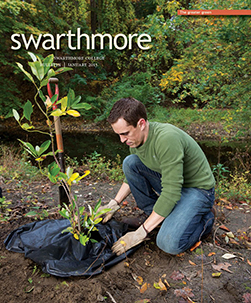Environmental Optimist
David Burack ’62 has worked for decades furthering sustainable development worldwide

David Burack ’62 examines the proposed site of an irrigation reservoir in Syunik Marz, Armenia, in 2010.
Although many sustainability experts express a doomsday view of Planet Earth’s future, David Burack ’62 is an optimist.
“It doesn’t mean the issues have gone away,” he explains, but addressing environmental concerns has become “second nature” around the world. Dealing with complex sustainability issues has led to the creation of a toolkit that includes legislation, analytical methods, and a large group of interested scientists.
Burack, whose graduate work was in conservation and forestry after receiving a B.A. in English literature and political science, has been immersed in the modern environmental movement from its beginning, with a career spent performing environmental-impact assessments in the United States and abroad.
Now semiretired, the Brooklyn, N.Y.-based Burack is a freelance contractor on short-term projects for groups like the United States Agency for International Development (USAID), the World Bank, and the European Commission.
For one recent U.S. Millennium Challenge Corp. project in Armenia, Burack analyzed the canals, pump stations, and drainage of a poorly maintained Soviet-era irrigation system.
“The important legacy is that I helped train a cadre of Armenian nationals on sustainable development and environmental assessment,” Burack says. These men and women can then apply their skills to other projects. “This is one of the aspects that contributes to [long-term] sustainability.”
Another aspect of his environmental work over the decades has been its connection to social-justice issues. In Abkhazia, a breakaway republic of Georgia, he helped USAID plan the rebuilding of roadway infrastructure that had been damaged or had deteriorated due to war. The road conditions made it difficult for farmers to resettle.
The project’s environmental preservation and social/environmental justice components suited him, he says. Burack gained the cooperation of community residents, who promised they would maintain the infrastructure if the government rebuilt it, thus ensuring a sustainable project.
Where the environment is concerned, Burack is perceived by some activists as having contrarian views because he sees the overall environmental situation as improving.
However, he notes, “I am still concerned that we have a limited amount of land in its wild state that is safely preserved in national refuges.” And he points to a “race” to solve new and ongoing environmental issues as the population grows and developing economies use natural resources at a high rate.
On the other hand, “Economic development assists the environment and conservation … that’s the trend right now.” He believes this is true because countries have the ability to employ a responsible approach to the environment when there is more wealth and prosperity.
His optimism can be traced to the fact that legislation put in place in the 1970s has made air and water cleaner than in the early 20th century and that paying increased attention to environmental issues and responses has become “the way the world does business.”
While at The University of Michigan–Ann Arbor, where he received an M.S. in conservation of natural resources, Burack joined other experts in developing legislation for environmental assessment that became the landmark 1969 National Environmental Policy Act. That law set the stage for en-suring that development was conducted in an environmentally and socially friendly manner.
Today, “the environmental ethic is very widespread,” he said. “There is a whole different attitude [from 50 or 60 years ago, and] that’s not going away.” That, he says, gives him hope for all of our futures.
 Email This Page
Email This Page